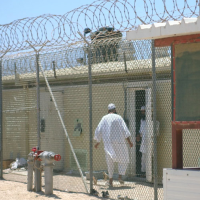Senate Proposal Would Allow Video Access to Civilian Courts by Guantánamo Detainees
 Credit: Department of Defense
Credit: Department of Defense
Charlie Savage, © 2016 New York Times News Service
WASHINGTON — Detainees at Guantánamo Bay, Cuba, could plead guilty to criminal charges in civilian court via remote videoconference under a provision being considered by the Senate that could open a new avenue to whittling down the prison’s remaining population.
The Senate Armed Services Committee announced late Thursday that it had included the provision in the annual National Defense Authorization Act. The bill, which now goes to the full Senate, would also authorize detainees who pleaded guilty through remote teleconference to be transferred to other countries to serve their sentences.
The legislation would largely extend an existing ban on bringing detainees to the United States. President Barack Obama had asked Congress to lift that ban; his plan for closing the prison is to bring a small number of detainees who cannot be transferred to a replacement wartime prison on domestic soil.
However, the bill would allow the temporary transfer of detainees to the United States for emergency medical treatment, the committee said. The base in Cuba has only limited medical equipment and capabilities.
The committee has not yet released the text of the bill. But it issued a summary after finishing a closed-door session on Thursday to make revisions.
Late last year, several lawyers who represent detainees sent a letter to the Justice Department expressing interest in exploring plea deals by remote teleconference — but only in civilian court, not military commissions.
“Allowing a detainee to plead guilty and cooperate with the U.S. government is a no-brainer,” said Wells Dixon, a lawyer for the Center for Constitutional Rights, which represents many detainees. “This provision should draw broad bipartisan support. It is an important step toward cleaning up the mess that exists at Guantánamo, and reducing the so-called irreducible minimum who remain in limbo.”
Civilian court offers several advantages for detainees seeking a defined sentence and an exit from the wartime prison.
Detainees who participated in a terrorist group but were not linked to any specific attack could plead guilty to several offenses under domestic criminal law, including conspiracy and providing material support to terrorism. A federal appeals court has ruled that those offenses are not available in a military commission because they are not war crimes.
In addition, civilian courts, unlike commissions, can count previous time in custody toward any sentence. Most of the detainees have been locked up for about 14 years without trial.
The detainees’ lawyers had argued that federal rules could be interpreted as permitting guilty pleas by remote video link. But Justice Department officials concluded that the rules did not permit people to plead guilty to a felony while not physically present in court, according to officials who spoke on the condition of anonymity to discuss internal deliberations.
Several weeks ago, the Obama administration sent to Congress several proposals about detainee issues to consider including in the National Defense Authorization Act, including steps to make military commissions, which have been plagued with problems, more efficient. (The committee’s announcement did not say whether it had approved that request.)
Officials said that the administration had also considered asking Congress to permit remote guilty pleas but decided not to after the Justice Department raised an additional concern: whether a judge would accept a guilty plea as voluntary when the alternative was continued indefinite detention, rather than a trial.
Eighty detainees remain at Guantánamo. Of them, 10 have been charged or convicted in the military commissions system, 44 have been neither charged nor recommended for transfer, and 26 have been recommended for transfer.
The administration’s interagency process approved transfer deals for 14 of the 26 on that list several weeks ago, officials said, although Defense Secretary Ash Carter has not yet notified Congress that he approved them. The statutory transfer restrictions require that he do so at least 30 days before any detainee leaves.
To Learn More:
Guantánamo Defense Lawyers Ask for Access to 14,000 CIA Photos of Secret Prisons (by Danny Biederman and Noel Brinkerhoff, AllGov)
Moving Guantánamo Prisoners to Super-Max Prison in Colorado: Obama vs. Congress (by Steve Straehley, AllGov)
5 Guantánamo Detainees, Never Charged with a Crime, are Released after 14 Years (by Noel Brinkerhoff and Danny Biederman, AllGov)
- Top Stories
- Unusual News
- Where is the Money Going?
- Controversies
- U.S. and the World
- Appointments and Resignations
- Latest News
- Musk and Trump Fire Members of Congress
- Trump Calls for Violent Street Demonstrations Against Himself
- Trump Changes Name of Republican Party
- The 2024 Election By the Numbers
- Bashar al-Assad—The Fall of a Rabid AntiSemite






Comments